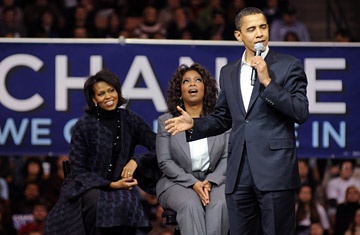
Democratic presidential hopeful Barack Obama addresses the crowd in Manchester, New Hampshire while Oprah Winfrey and his wife Michelle listen, Dec. 9, 2007.
Manchester's Verizon Center has, undoubtedly, seen many iterations of the wave. I suspect, though, that the occasion of a visit from Barack Obama and Oprah Winfrey marked the first time the arena hosted a wave performed by an audience divided equally between middle-aged ladies in Christmas sweaters, hipsters in cords and ringer-tees and men of indeterminate ages bundled into parkas. Almost all of the 8,500 people packing the Center were white — and they were there to see two black people. Neither of whom would sing or throw a ball.
The wave was just one of the ways the audience tried to work off its nervous energy. They danced, they chanted. As disco music played, those seated near the curtained hallway to the back and left of the stage gasped when an elegant black hand briefly parted the curtain. An older black woman in an Obama t-shirt, bright kerchief and big glasses had a view just inside the sanctum; she hopped to her feet and waved her hands like she had just seen Elvis. The hand outside the curtain waved and pointed to her with an ironic, hep-cat flick of the wrist: Right on.
All of Barack Obama would emerge only after short speeches from his wife Michelle and his friend Oprah. Winfrey used her patented mix of girlfriend-style dish ("When Gayle and I talk... mmmm-mmm... we also talk about real things...") and campaign-style sermonizing ("Experience... means nothing unless that person is accountable for the judgments they made during the time they had.") That recipe was calibrated to reassure the audience that neither Oprah nor Obama was compromising here — that Obama's ambition to be a candidate of nobility would not be diminished by Oprah's status as a consumer guide. She even joked that she knew endorsing him was not the same as endorsing a new refrigerator. At the same time, neither would Oprah's role as a cultural arbiter be diminished by her foray into politics. When her speech reached its climax, the touchstone was not the words of Martin Luther King Jr. (though he was mentioned), but a novel: The Autobiography of Miss Jane Pittman. The slave Jane Pittman, Oprah said, looks for the one who might free her for years, asking, "are you the one?" Oprah then told the crowd, "He is the one."
The frenzy that then greeted Obama, nearly four hours after the crowd had lined up outside the arena, was full of awe and hysteria. A lot people get excited to shake a politician's hand; not so many greet one as though he were about to heal them by laying his on them.
Blurring the edges of the occasion, though, were reminders of political realities. Secret Service agents stood every ten feet at the edges of the in-the-round stage, their impassivity glaring, while the cheery, hand-painted signs waved by the crowd ("Obama 4 NH," "HOPE/OBAMA") worked best if one forgot that no audience members were allowed to bring signs in; anything that the crowd waved, no matter how sincerely they brandished it, had been provided for them. The campaign even roped the press into the game, emblazoning their badges not with the usual time/place/date formula ("Midwest Express Tour October 2007," etc.) but with the same slogan that staff wore: "Change We Can Believe In."
Pundits have focused on whether or not Oprah's presence on the campaign trail will bring Obama more voters, but the four rallies Opr-ama did over the weekend were not intended to change people's minds. They were about creating the kind of audacious political theater that makes supporters believe they're going to win, and casual observers into interested ones. Indeed, the Obama campaign used the rallies less as an outreach program than as a reward system, distributing tickets to volunteers and those who had pledged to volunteer with higher priority than the general public. And those in attendance waved their appreciation.
